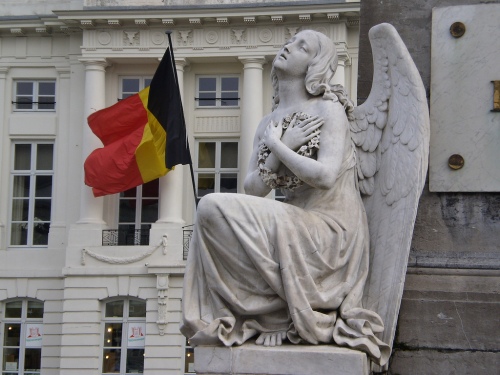By Pasquale Gianni

The incredible resilience and strength of Europe during recent terrorist attacks proves that nothing can destroy true hope. (Courtesy of Flickr)
The recent attacks at Brussels Airport and a nearby metro station sent shockwaves throughout the world. Of all the European cities to be targeted, Brussels was symbolic because of its de facto position as the seat of the European Union.
The attack took place in a city with a large network of radicalized jihadists. To be expected, fear was felt from Stockholm to Athens. It is beginning to turn into a tragic tale that has no foreseeable end in sight.
I woke up the morning of March 22 in a Paris hotel room to CNN International breaking the news of the events transpiring in Brussels. It was heartbreaking, but I cannot say that it was shocking.
The November Paris attacks that left 128 dead were reported to have been planned in Brussels. On that solemn day in November, everyone in Europe became French: a spiritual transgression of nationality in solidarity with those dealing with the horrific tragedy.
On March 22, Europe, especially France, became Belgian. All over Paris, the black, yellow and red Belgian flag could be seen at the city’s most important institutions and attractions. Despite the circumstances, the display of fraternity was actually a beautiful thing: the kind of thing that Europe needs more of at a time when the European Union is facing such an incredible test.
But the French are showing the Belgians much more than solidarity. They are proving that it is possible to move forward. Instead of responding to terrorism with crippling fear, the French continue on with their daily lives as a sign of unity, as if to say “we are not afraid.”
For this to happen, people must first recognize a few things. First, the terrorists can only hope to bring down western civilization and establish a caliphate in Europe, but they can continue to be a menacing presence. This fear is mainly due to the media’s willingness to cover and talk about terrorism and terrorist groups more than they should. President Obama was right to say that people are still more likely to face death from slipping and falling in the bathtub than from a terrorist attack.
More importantly, terrorists can incite overreaction, which is their main goal. On an individual level, this means living with constant anxiety, as many now unfortunately do. People are refusing to travel, or even go to public places and events such as sporting events, museums or restaurants because of safety concerns.
In 2014, the number of Americans killed by terrorists on the home front was just 17. Meanwhile, 32,675 were killed in automobile accidents and yes, even a much larger number from drowning in baths: 464.
In France, despite being on high alert with tight security, people seem to understand this unlikelihood. They stick to their daily routines and western ways of life, making it a point to not let the terrorists succeed.
The night of the Brussels attacks and the few days I was in Paris afterwards, Parisian cafes were bustling, concert halls were packed to the brim and the city had a special feel to it.
The city hummed with resilience, letting the world know they’ve been through this before and they’ll get through it again. It was certainly something to admire, but also something to learn from.
As I waited in the unusually long security line at the Paris Orly Airport, sad to leave what is undoubtedly one of the most beautiful cities in the world, an announcement came on the loudspeaker and proclaimed that lines are taking longer than usual because of heightened controls. The man in front of me turned, shrugged his shoulders and uttered “these are the times we now live in.”
